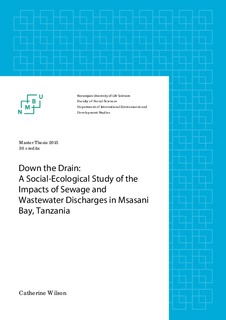Down the drain : a social-ecological study of the impacts of sewage and wastewater discharges in Msasani Bay, Tanzania
Master thesis
Permanent lenke
http://hdl.handle.net/11250/2359366Utgivelsesdato
2015-11-05Metadata
Vis full innførselSamlinger
Sammendrag
Msasani Bay, Dar es Salaam, is situated among important marine habitats such as the highly complex, biologically diverse and productive systems of coral reefs, mangrove forests and seagrass beds. Marine biota in such tropical ecosystems are typically more sensitive to pollution than those of temperate biotopes. This thesis examines the impacts of sewage and wastewater pollution on human communities and the marine ecosystem of Msasani Bay. Data was collected through semi-structured interviews with five main actor groups, namely households, fishers, industries, health clinics and institutions, in addition to measurements of faecal coliform, salinity and phosphorus in the water of the bay and river mouths. A conceptual framework of vulnerability and social-ecological resilience was adopted to frame the findings. The study reveals increased vulnerability and lowered resilience of the SES of Msasani Bay. The current mode of sewage and wastewater disposal failed to protect the rights of communities to a clean, safe and healthy environment and the surrounding ecosystem from deleterious water pollution. Domestic and industrial sewage and wastewater are discharged untreated into streams and rivers, thus creating potential for annual floods to severely impact disadvantaged actor groups, but also to impact the entire community. Institutional analysis and research findings revealed that Government and institutional ineffectiveness, through poor town planning and corruption, have produced the conditions through which these discharges have the greatest impact. The situation has given rise to three key system variables that indicate the seriousness of the SES: lives and livelihood destruction, the spread of diseases, and a major loss of biodiversity. The ecosystem in Msasani Bay has significantly changed over the past few decades and has the potential to flip into a further polluted and dysfunctional alternate state. Faecal coliform and nutrient analysis revealed high contamination in all sample locations throughout the bay. These samples were categorised as unsafe for recreational waters by a wide margin, representing exceedingly high risk to human health. Moreover, a high number of interview respondents, such as those closely located to polluted rivers, and fishers in Msasani Bay noted illnesses known to be associated with sewage. This study concludes by affirming the need for community activism and governmental response for improved sewage and wastewater treatment, and more innovative infrastructure for the growing urban population of Dar es Salaam, as the present SES is simply unsustainable.
